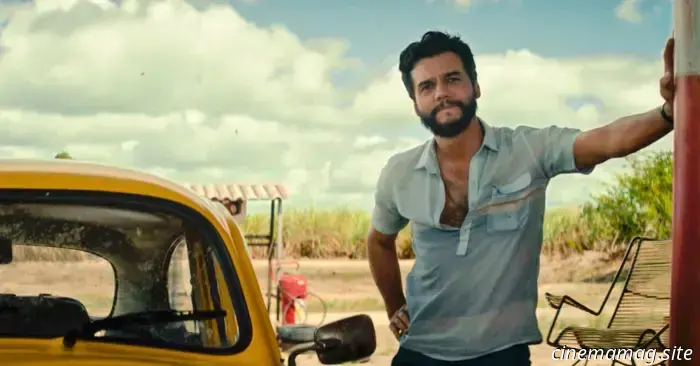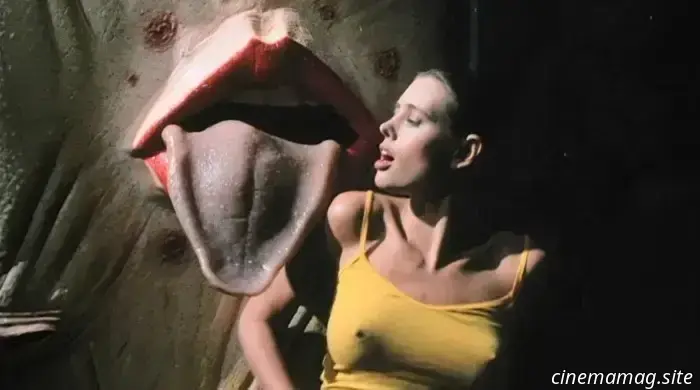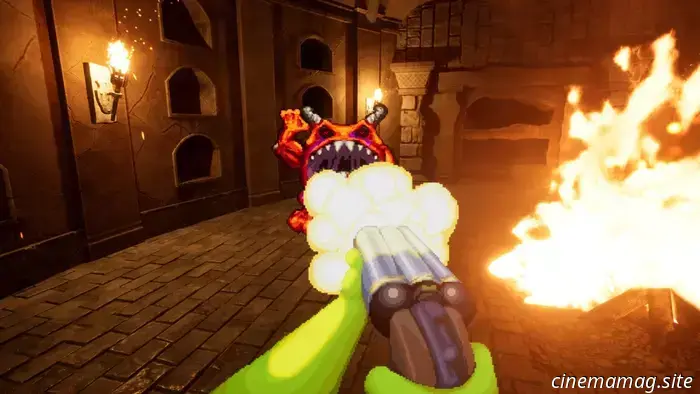
Cannes Review: The Secret Agent is an Exciting and Disturbing Thriller by Kleber Mendonça Filho.
When Armando (Wagner Moura) ultimately decides to obtain a fake passport and a one-way ticket to escape Brazil with his young son, he consults his father-in-law for a suitable location to meet a fixer. The elder suggests a room at his workplace: a cinema. This choice—an establishment that serves as the sole safe haven from death—is both romantically idealistic and reflective of Kleber Mendonça Filho’s infectious love for film, as seen in The Secret Agent, a gripping and unsettling thriller into which Armando enters as a tragic protagonist. Those familiar with the Brazilian director’s body of work will recognize these nods as a recurring theme, while newcomers will still feel the warmth he expresses toward cinema—its creators and the venues that showcase it. As a critic-turned-filmmaker, Mendonça Filho uniquely conveys his passion for film in a palpable and contagious manner. While some of his works, like the rural siege western Bacurau, directly reference works by John Carpenter or Sam Peckinpah in modern Brazil, many of his films serve as heartfelt tributes to the theaters themselves. In his recent documentary Pictures of Ghosts, the director focused on venues across his native area (or what remains), prompting viewers to reflect on the evangelical churches and ruins that have replaced them.
Despite the film's sense of nostalgia, an underlying anger permeates it—Mendonça Filho is not merely reminiscing about his childhood spots but highlighting that the disappearance of these physical venues signifies a collective loss. This notion is not new. Whether fictional or real, the director’s works are infused with a simmering rage. This is palpable throughout Bacurau, which tells the story of a fictional village threatened by murderous white psychopaths, as well as in Aquarius, where a woman resists giving her beachfront apartment to property developers aiming to transform it into another luxury tower.
A similar sense of fury flows through The Secret Agent, set in late-1970s Brazil, the film uncovers a tragic period in the nation's history when the military dictatorship, which started in 1964, exploited an economic boom dubbed the “Brazilian Miracle” to imprison, torture, and execute various dissidents and undesirables. Armando is among their targets, but Mendonça Filho's script takes time to reveal who or what he is fleeing from. The film runs for two-and-a-half hours, with the late-night cinema meeting occurring near the halfway point. It is only then that Armando divulges his backstory. Once a university researcher overseeing a group of scientists seeking cleaner energy solutions, he was seen as a threat to the government's agenda, leading to a powerful figure being sent to halt their work. Armando resisted, and consequently, nearly everyone he loved faced dire consequences.
On the run since his first appearance on screen, Armando arrives in Recife to reconnect with his son Fernando (Enzo Nunes) and whisk him away from danger. He has cut his hair, shaved his beard, grown a mustache, and assumed a new identity. Now going by "Marcelo," he spends the first half of the film integrating with a small group of traumatized refugees, all of whom, like him, are hiding and anxiously waiting to escape the country. (Udo Kier, last seen in Mendonça Filho’s cinematic world as the leader of the assailants in Bacurau, makes a brief appearance as a Holocaust survivor, hinting at a long history of persecution that goes beyond Brazil.) This represents one storyline. However, the director often veers back to the present, intertwining Armando / Marcelo’s journey with that of a young university student, Flavia (Laura Lufési), tasked with transcribing tapes of his confession made inside that cinema decades earlier.
This startling shift feels in line with Agent’s larger design: facilitating an uncomfortable dialogue between the past and present. Much like Pictures of Ghosts, the entire film is haunted by memory, evident not only in its contemporary scenes. The film opens with black-and-white images depicting people and everyday life in 1970s Brazil, resurrecting 1977 Recife with meticulous attention to the city’s sounds and textures, reflecting Mendonça Filho’s affection for how it appeared in his youth. Additionally, Agent unfolds during carnival, allowing Recife to pulsate with life at its most chaotic and vibrant; even though the film is enveloped in darkness, its visuals are stunning.
By holding back information and gradually allowing viewers to piece together the puzzle, Mendonça Filho’s script operates in a mysterious manner. However, once the hints are revealed and Agent's narrative aligns, this decision makes the journey even more explosive. There is an acute sense of urgency in his storytelling, yet this urgency coexists with strange, pulp-inspired detours—similar flourishes that contributed to Bacurau's recognition at Cannes as a unique creation. Armando encounters a two-faced cat upon arriving in the city.

Other articles
 Best Films That Motivate the Upcoming Generation of Digital Gaming - MovieMaker Magazine
Discover how renowned movies have influenced the storytelling, visuals, and gameplay mechanics across various gaming genres.
Best Films That Motivate the Upcoming Generation of Digital Gaming - MovieMaker Magazine
Discover how renowned movies have influenced the storytelling, visuals, and gameplay mechanics across various gaming genres.
 Obscure Cult Films from the 80s You Might Have Overlooked
Casey Chong presents a collection of bizarre cult movies from the 80s that you might have overlooked… One of the greatest aspects of watching films is the wide range of genres, spanning from mainstream, audience-friendly productions to independent films, and even to those that challenge genre norms or are simply odd. These films can be those where logic [...]
Obscure Cult Films from the 80s You Might Have Overlooked
Casey Chong presents a collection of bizarre cult movies from the 80s that you might have overlooked… One of the greatest aspects of watching films is the wide range of genres, spanning from mainstream, audience-friendly productions to independent films, and even to those that challenge genre norms or are simply odd. These films can be those where logic [...]
 Cannes Review: Carla Simón's Romería Explores Personal Themes of Intergenerational Conflict
Building on the understated style of her Golden Bear-winning film Alcarràs, Carla Simón presents Romería, yet again exploring themes of generational conflict. This film delves into the narratives that families decide to share and those they keep hidden, set against the backdrop of Spain's Atlantic coast. Here, 18-year-old orphan Marina (Llúcia Garcia) seeks to reconnect with her paternal roots.
Cannes Review: Carla Simón's Romería Explores Personal Themes of Intergenerational Conflict
Building on the understated style of her Golden Bear-winning film Alcarràs, Carla Simón presents Romería, yet again exploring themes of generational conflict. This film delves into the narratives that families decide to share and those they keep hidden, set against the backdrop of Spain's Atlantic coast. Here, 18-year-old orphan Marina (Llúcia Garcia) seeks to reconnect with her paternal roots.
 The horror action game Frog Legs leaps onto Steam.
Independent developer Elliott Dahle has revealed the launch of his amphibian horror action game, Frog Legs, on PC through Steam. This brief, narrative-focused game centers around an ordinary frog as he leaps, runs, and ribbits in an attempt to flee from his past. Featuring arcade segments inspired by Frogger, boomer shooter gameplay, and a haunting narrative, Frog Legs represents horror with […]
The horror action game Frog Legs leaps onto Steam.
Independent developer Elliott Dahle has revealed the launch of his amphibian horror action game, Frog Legs, on PC through Steam. This brief, narrative-focused game centers around an ordinary frog as he leaps, runs, and ribbits in an attempt to flee from his past. Featuring arcade segments inspired by Frogger, boomer shooter gameplay, and a haunting narrative, Frog Legs represents horror with […]
 S.T.A.L.K.E.R.: Legends of the Zone Trilogy Enhanced Edition is now available.
GSC GameWorld has unveiled the launch of S.T.A.L.K.E.R.: Legends of the Zone Trilogy Enhanced Edition for PC, PlayStation 5, and Xbox Series X|S. This new edition includes improved versions of Shadow of Chernobyl from 2007, Clear Sky from 2008, and Call of Pripyat from 2009. The trilogy has been fully revamped for modern platforms, allowing players to […]
S.T.A.L.K.E.R.: Legends of the Zone Trilogy Enhanced Edition is now available.
GSC GameWorld has unveiled the launch of S.T.A.L.K.E.R.: Legends of the Zone Trilogy Enhanced Edition for PC, PlayStation 5, and Xbox Series X|S. This new edition includes improved versions of Shadow of Chernobyl from 2007, Clear Sky from 2008, and Call of Pripyat from 2009. The trilogy has been fully revamped for modern platforms, allowing players to […]
 Marvel takes a trip down memory lane with Retrovision variant covers.
Marvel Comics has revealed plans to transport variant cover collectors back in time this July with its 'Retrovision' variants, featured across 22 ongoing titles. This initiative will have contemporary artists honoring the classic Silver Age aesthetic by combining elements of the past with today's style. You can check out […]
Marvel takes a trip down memory lane with Retrovision variant covers.
Marvel Comics has revealed plans to transport variant cover collectors back in time this July with its 'Retrovision' variants, featured across 22 ongoing titles. This initiative will have contemporary artists honoring the classic Silver Age aesthetic by combining elements of the past with today's style. You can check out […]
Cannes Review: The Secret Agent is an Exciting and Disturbing Thriller by Kleber Mendonça Filho.
When Armando (Wagner Moura) ultimately decides to obtain a counterfeit passport and a one-way ticket out of Brazil for himself and his young son, he asks his father-in-law for a location to meet a fixer. The grandfather suggests a room at his workplace: a cinema. This option (a movie theater)
